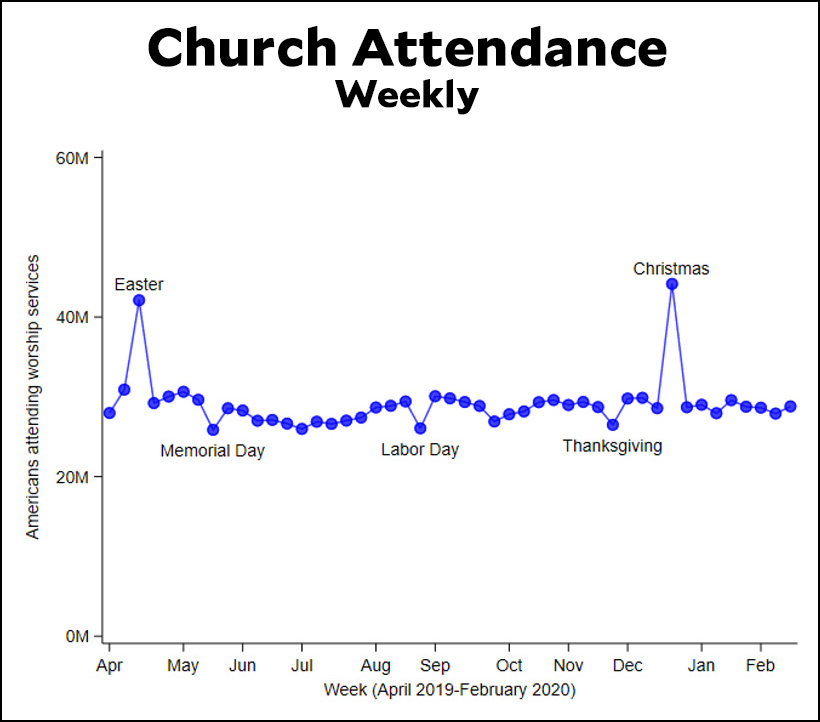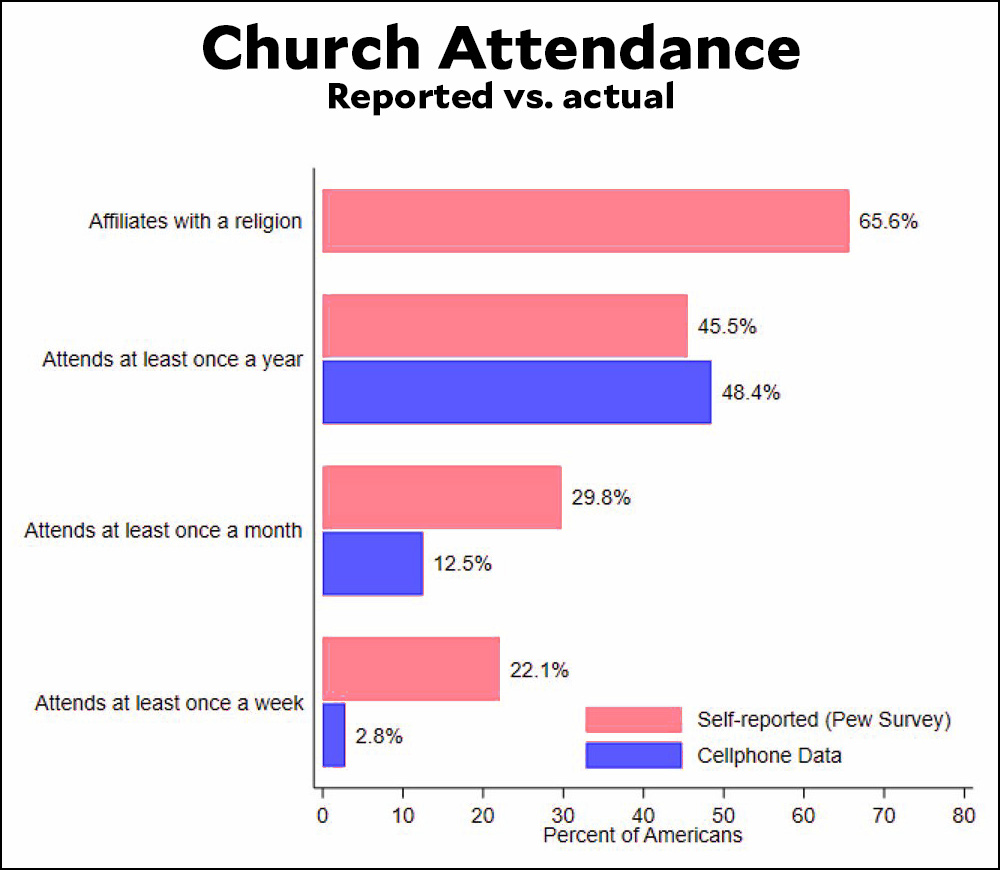Here's an interesting little tidbit about religion in America. Devin Pope of the University of Chicago has been tracking church attendance using cell phone data that tells us whether you're really in church, and his results are remarkably consistent:
 Week in and week out, there are roughly 25 million Americans at church each Sunday. Note that this is not the number who attend church every single week. It may be different people each week who make up the 25 million. So how does this compare to the number who say they attend church?
Week in and week out, there are roughly 25 million Americans at church each Sunday. Note that this is not the number who attend church every single week. It may be different people each week who make up the 25 million. So how does this compare to the number who say they attend church?
 People lie a lot about church attendance! A quarter of Americans say they attend church weekly, but in reality fewer than 3% of them do. That's about 8 million regular weekly churchgoers.
People lie a lot about church attendance! A quarter of Americans say they attend church weekly, but in reality fewer than 3% of them do. That's about 8 million regular weekly churchgoers.
That's . . . not very many. And not counting the Christmas & Easter crowd, only about 12% of Americans attend church at all. That's not very many either.

Churchgoers are about the same proportion of the population as union members. I bet the latter wish they got the same attention from politicians and the media.
Well, they do get demonized by the right wing. Not the attention they want I wager.
Finally, my paycheck is $ 8,500 A working 10 hours per week online. My brother’s friend had an average of 12K for several months, he work about 22 hours a week. I can not believe how easy it is, once I try to do so. This is what I do
🙂 AND GOOD LUCK.:)
.
.
.
HERE====)>> GOOGLE WORK
Hmm. I worship on Sundays, but since Covid began in my area, I have worshipped via Zoom. Does that count?
The data ends February 2020.
So, they're liars? Why am I not surprised? Too bad it doesn't break down by religion. It's just my opinion, but I think the most conservative Christian churches have the most liars. After all, they don't seem to know a single thing about the word of Jesus
I'd bet it would be the Catholics, but that's probably because I was - as the saying goes - raised Catholic.
Saturday is the new Sunday.
It's long past time we treat religion with the contempt it deserves.
Bingo. When I hear the phrase "sincere religious beliefs" I wonder what civil right they want to take away.
A further piece of evidence that polling is incredibly... imprecise.
It's really creepy that someone can make this chart. Really really creepy.
An excellent point. On the other hand, it appears to track only (1) those who take their phones into church, and (2) who leave them on during the service, AND (3) have location services turned on.
Although, as you note, how the survey folks got their hooks into this supposedly private data is the big question.
They bought it. From legal sellers, the service providers.
And THIS sort of thing is EXACTLY why we need to OUTLAW ARITHMETIC in schools! It's SATAN'S SHORTHAND, that's what it is! And did you know they use ARAB numbers? We're teaching ARAB SATANISM IN OUR SCHOOLS!!11!!
😄😄😄
Thank God the Founding Fathers inadvertently decided to give churchgoing and “churchgoing” people more say in what our national government does than the rest of us heathens.
... and just as importantly, the right to treat some of their fellow-citizens as second-class because of their sincerely held religious beliefs. After all, nothing shows their love of Jesus better than hating on certain people.
A survey on church attendance conducted by Pew? Sounds about right to me.
Like!
Do the tweets provide data on cell phone usage by religious/non-religious people and whether people always bring their phones to church?
Maybe they leave the cellphone at home for church days?
Or religious folks use landlines?
Or their phones aren’t divulging their location.
Phone locations aren't always pinpoint accurate. I'm checked into a motel in Florence SC, on my way home from a trip down to Florida. Just checked my location on Googlemaps-- look like I'm at the Waffle House next door.
Yeah, plus church attendance slants disproportionately toward old people and children, neither of whom are as likely to have cells or to take them to church. The study author doesn't mention in his tweets whether he's accounted for that.
Still a lot for an educated society.
There are many reasons to go to church. The most important for me is the sense of community I get from surrounding myself with people intent on becoming the best versions of themselves. There are very nice people at my church that are a pleasure to be with.
I don’t know about anyone else, but my location services are sufficiently locked down that I doubt Pope’s statistics would include my location. I suspect that is true for many others as well.
Also, I go to a church weekly, but I don’t “go to church”. It is strictly for secular purposes.
You go to pick up chicks?
Really looking forward to Bobber's answer!
Most likely an AA or NA group. Many, many such groups meet in churches.
If that's the case I apologize to Bobber.
A lot of churches provide services on other days besides Sunday, so this data is incomplete. But I'm sure the majority who attend do attend on Sunday.
Church service attendance is not the same as identifying as religious though.
I guess when we talk about attending “church” we are talking about Christians.
If I interpret "at least once a week" as meaning attendance 52 Sundays in a year, 3 percent seems high. A more realistic measurement might be 40 Sundays in a year.
This. If asked, I would say I attend once a week. But it's probably really 48 times a year, plus Christmas. How much hair-splitting is Pope doing?
A lot of studies have long suggested people greatly exaggerate their church attendance and that polling on this issue is way off. But I am very skeptical that less than 60 million Americans are at Church on Christmas and Easter. There are over 330 million people in the USA. About 64% of people identify as Christian. Is it really plausible that so few people go to Church even on Christmas and Easter? Is it not including Christmas Eve or something? Is it just Sundays, and thus doesn't capture Christmas? I don't even identify as Christian, but I am sometimes at Church on those days.
Also, just to follow up, I don't remember a single Christmas where the church wasn't packed beyond capacity, with multiple services. People have talked about Easter-Christmas Christians forever. Have they all just disappeared? A quick google shows people are still talking about this phenomenon. Just calls the whole study into question, unless I'm misreading the chart.
As a regular church attendee, I will say basically no one attends every Sunday. Everyone takes vacations and gets sick. A very high attendance person will typically make it 48 times a year. A real regular is about 40. Many people come about half the time (divorced parents often only come on the alternate Sunday they have the kid). The big gap between 1x month and weekly is an issue with this poll. Lots of people will pick every week if they average at least half. They are just rounding up. I certainly say weekly for myself, even though I miss 3-5 Sundays a year. But I also attend some Wednesday services, so some weeks double up.
Older parishioners tend to not have cell phones, and may have more missed services due to illness (not "skipping"). Some at my church disappear up to the lake all summer, although they are there every Sunday from the weekend after Labor Day until the Sunday before Memorial Day weekend. Old people are a big demographic, so missing their data due to having few phones and them rounding up their typical 40 weeks a year will really skew things.
Catholics, especially, seem to like going on Saturday night instead of Sunday. Small rural parishes often share a pastor or priest, resulting in unusual service times/days.
I'm don't necessarily think that numbers provided by the cellphone data are all that precise, but the story is that there is a huge mismatch between what the congregates say and what they do. Besides all that, it showcases that polls themselves are incredibly shoddy.
¯\_(ツ)_/¯
God's newly updated Commandment:
You shall not bullshit about your religiosity
Arguing the statistics, location services, etc etc is meaningless. These numbers jibe exactly with what any casual or methodical survey of almost any U.S. town or city shows - small, and even not so small churches closing their doors or preaching to shrinking, gray haired congregations. In the 25 years I lived in Austin I personally saw at least half a dozen small neighborhood churches close (some of them really nice). Back in New England, the local medium sized Catholic church has gone to one mass on Sunday with the church a quarter full of septuagenarians and older; larger churches have closed all over the metropolitan area and are selling their property. It’s rural as well - churches throughout the state have been repurposed as community centers, etc. Conversely, what I saw in Austin is I’m sure true elsewhere - the Baptist mega-churches are thriving, like WalMarts of religion.
This is, of course, a huge shift, probably somewhat similar to Europe. It’s not going back, and the implications are pretty important.
You make a very important point - I wonder how many of the Faithful that attended with corroborating cellphone data are in those mega churches. A high percentage? In the Bible Belt? I'm sure there is a breakdown of the data but BirdApp never had me and never will.
Specifically You’ll choose up Up To from 99000$ Bucks A Month! There are no confinements, Be Your Claim Boss, it All depends on you And how much you wish to win each day. {mkj-254} This will be regularly a veritable and ensured method for complimentary to win a tremendous total of cash at family.
Click on the link below.. https://createmaxwealth.blogspot.com/
I wonder who gets counted because other events are held at churches?
On Sundays? Probably rather few churches hold events that would conflict with their religious service times.
Yah. My polling place is a church, but that only happens on Tuesdays. Many AA and NA groups meet in churches, but certainly not on Sunday mornings. There is one denomination - Seventh Day Adventists - who actually meet on Saturday mornings and maybe let other groups use their building on Sunday morning, but they are a tiny percentage of the total.